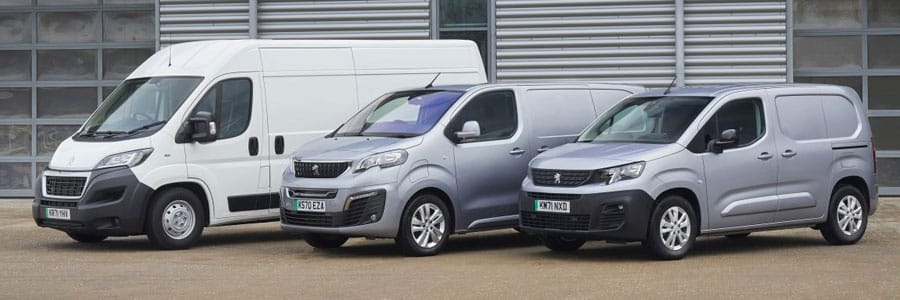Why you should switch to an eLCV

Electric vans are big business, with new models arriving regularly as manufacturers rapidly expand the models available. The activity is giving extra vitality to this sector with the promise of low running costs and greater suitability for typical LCV trips.
What's more the Government has provided a period of financial support stability for two years following the extension of the plug-in van grant - see our story Extension for plug-in van grant.
We look at the benefits that leasing an eLCV could bring.
Cheaper fuel
Electricity is not taxed in the same way as diesel, and as such it is much cheaper to run an electric vehicle than a fuel-powered one. Electricity costs are rising, but so too have diesel prices, and it remains significantly cheaper when looking at a pence-per-mile basis.

To fully recharge the 75 kWh battery of a Vauxhall Vivaro-e will cost £15 at 20p/kWh for 205 miles of range - 7p/mile. In comparison, a similar diesel Vivaro will cost £105 for a full tank of diesel at 150p/litre for a range of 620 miles - 17p/mile.
Plenty of range
Businesses have varying needs, load sizes and weights, and work in vastly different territories, but many would be able to switch at least part of their fleet to pure-electric vans. Working on the UK average van mileage of 13,000 a year (according to government statistics), that would equate to around 50 miles per day.

There are a great number of vans on the market, from compact supermini-sized models like the Renault Zoe Van to large vans such as Fiat's e-Ducato, that can comfortably cover that distance, even in winter and with a load.
Driving ranges available for new vans range between 100 and 200 miles on a charge, depending on model. Some can exceed the 200 mile mark, but even those with a smaller range would suit plenty of businesses, which also benefit from well recognised routes and use cases, established with diesel models over recent years.
What's more the latest vans - such as the latest eVito - come with rapid charging capability, allowing a recharge of some 100 miles within 30 minutes.
No compromise on load area
The majority of eLCVs have no reduction in load area when compared with a conventional diesel model. The main logistical logistics are the reduced range on a single charge - though this has been covered above - and a reduced payload.
The reason behind this is because the eLCV's battery can often weigh many hundred kilograms, so the ratings have to be adjusted accordingly.
That said, these tend to be within a similar range. Comparable Peugeot Expert and e-Expert models for example have a payload of almost 1,450kg and around 1,225kg respectively. So unless you're getting close to maximum payload each time you load up, there is likely to be little change to logistics.
Improved TCO
Total Cost of Ownership (TCO) is a significant factor in running a vehicle for a business, and alongside the lower fuel costs eLCVs present, they also offer reduced TCO figures.
An electric powertrain is simpler to maintain than a diesel engine and systems, plus brake discs and pads last longer thanks to brake energy recuperation. This sees the vehicle invert the electric motor, using it to help slow the van down and charge the battery a little rather than draw power from it.
Tax benefits see the Van Benefit Charge set at £0, and there are Plug-in Van Grants available to reduce the monthly cost of the vehicle.
Green image
By driving an electric van, it gets involved in a business's marketing from the off, with no additional spend. A near-silent, zero-tailpipe emission vehicle is something that people notice, and it can help present a business with an improved environmental reputation.
Using an eLCV for deliveries means that there is no local air pollution as electric vans produce no emissions during operation. Equally, noise pollution is reduced, further enhancing the reputation of your business.
Better to drive
Many vans are used for local routes (51% of all van driving according to Government stats), and are regularly being run for very short periods before either being left on while delivering (damaging a firm's reputation and wasting fuel) or being turned off and on repeatedly, causing increased wear.
An electric van has quicker pick-up thanks to the instant response and torque offered by electric motors, making them spritely to drive and well-suited to urban deliveries.
Add in the near silent operation and the experience of driving an electric van becomes a more peaceful and relaxing experience, offering a revolution for the driver as much as your fleet.
Rob Marshall, Operations Director of Gateway2Lease, offers this view on eLCVs:
"While the Government's 2030 ban on petrol and diesel new vehicle sales still feels some way off, it is in fact just two van lifecycles away. Getting in early with an electric fleet will not only help operators with their Environmental, Social and Governance reputations, but establish the operational requirements that will become mandated by 2030.
"Not only that, but increasingly fleets will need to meet the sustainability ambitions of their clients, which will inevitably include an electrified fleet. For commercial van fleets operating local deliveries - that's more than 50% of van journeys - there's little justification not to consider van fleet electrification.
"We can offer our help and experience to van operators who wish to decarbonise their fleets. Please don't hesitate to get in touch with us if we can help in any way."
View our latest blog posts

Categories
Pages
We are a family run business based in rural Worcestershire. Our team of 38 staff are on hand to provide an exceptional service to personal and business customers.
Read More
